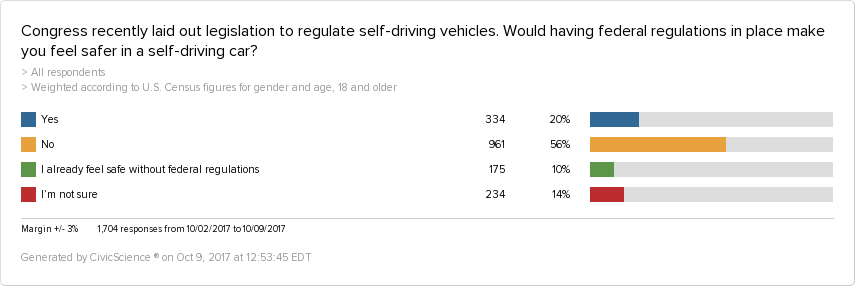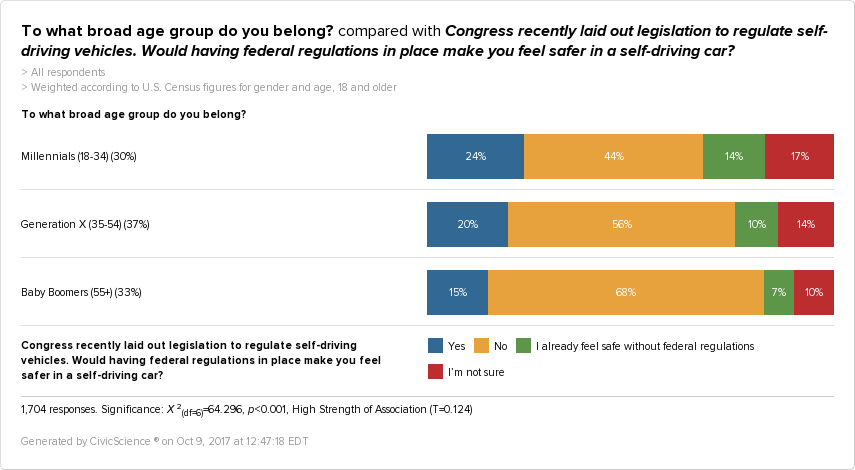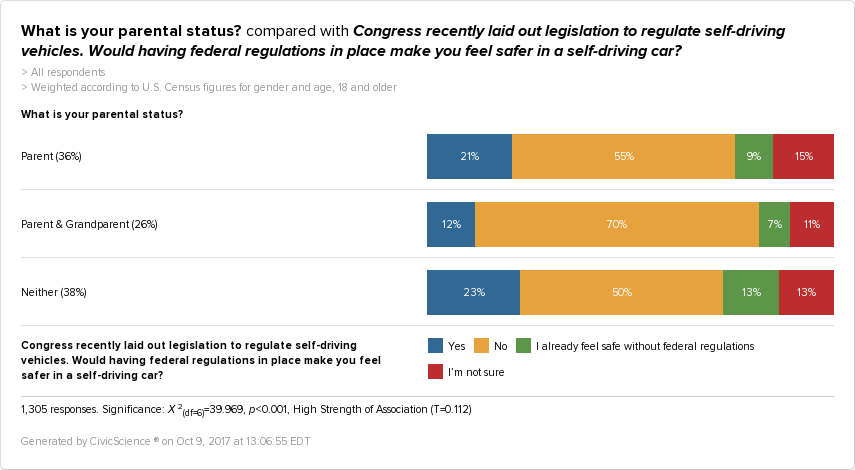The Gist: We explored how Congress unanimously passing legislation to regulate self-driving cars changed people’s opinions on automated vehicles. What we found is that government regulation leads people to trust self-driving cars more, especially among Millennials.
We first asked about self-driving cars in August of 2016, after Uber launched its first fleet.
Back then, 64% of respondents said that they wouldn’t feel safe in a self-driving car, even with an employee at the wheel.
We checked again in January of this year and that number actually jumped to 69%.
Now, we’re asking again after the announcement that Congress unanimously voted for legislation to regulate self-driving vehicles.
Primed with that knowledge, 20% of respondents (who didn’t already feel safe) said they’d feel safer in self-driving cars. Only 56% said a hard “No,” they would not feel safer.
Let’s take a look at whose minds are changing and whose are standing firm.
Millennials vs. Boomers
It’s immediately clear that age makes a huge difference in how much people trust self-driving cars.
14% of Millennials, the digital natives, say they already feel safe in a self-driving car, and almost ¼ of them say that government regulation would make them feel even safer.
However, only 15% of Boomers say they’d feel safer in self-driving cars with government regulation in place, and 68% are standing firm in their distrust of self-driving cars. That’s 35% more than Millennials!
Other Demographics
I also looked at income, urbanicity, and race. I found correlations, but they weren’t nearly as obvious as age.
- City dwellers are most likely (23%) to feel safer in self-driving cars with government regulations in place and respondents in rural areas are most likely to say that they would not feel safer (61%).
- Hispanic/Latino respondents are most likely to feel safer in self-driving cars with government regulations in place (24%). Black respondents are least likely to say they already feel safe in self-driving cars (5%) and most likely to be unsure about whether they’d feel safer in self-driving cars with government regulations in place (24%).
- People making over $100K annually are most likely (27%-28%) to say they’d feel safer in self-driving cars with government regulation in place. Those making $50-$100K annually are most likely to say that they would not feel safer (61%). Respondents making under $25K annually are most likely to be unsure (21%).
I did not find any strong correlations for education level or gender.
Parental Instinct
Finally, I wanted to look at parental status. I wondered how being in charge of another life would affect respondents’ opinion on this matter.
Respondents who are neither parents nor grandparents are most likely to already feel safe in a self-driving car, at 13%. They are also most likely, by a little, to feel safer with government regulations in place (23% compared to 21% of parents). Parents are more likely than non-parents, by 10%, to not feel safer in a self-driving car with government regulations in place.
The most obvious finding here, however, is that respondents who are both parents and grandparents are most likely, by a lot, to say that they would not feel safe in a self-driving car, even with government regulations in place (70%).
I imagine that age is playing a larger role here than protective parental instinct.
Conclusion
It seems pretty clear that the self-driving car market is a young man’s (or woman’s, there was no strong correlation between gender and feeling safe in self-driving cars) game. If self-driving cars want to succeed, they have two options: They can either play to their current likely fanbase of Millennials, or work to win over their biggest dissenters, the Baby Boomers.











